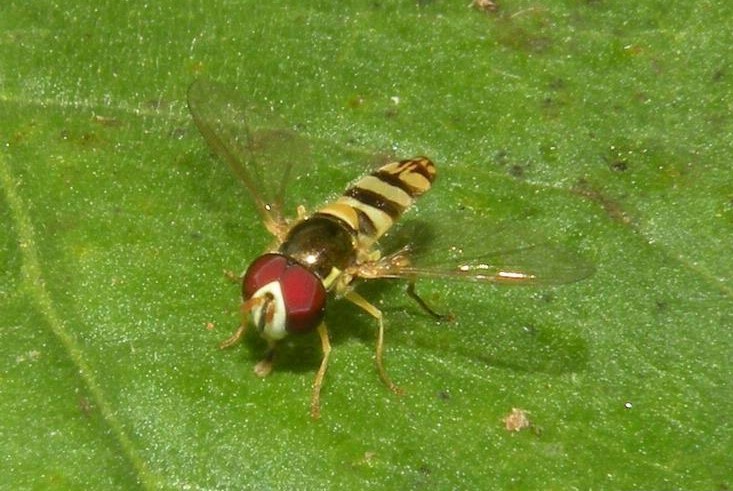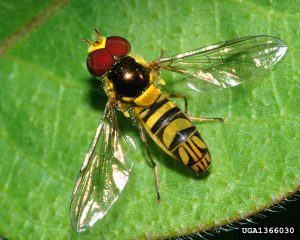
While we think of most flies as pests, garden flies, such as Allograpta obliqua species found in Florida, are excellent pollinators and predators of insects. Photo by Jessica Louque, Smithers Viscient, Bugwood.org.
While our sentiments toward flies usually involve fly swatters, believe it or not, not all flies are nuisance pests! Some types of flies can actually be quite helpful in the garden.
These garden flies are nothing like your typical pesky house fly. While house flies and garden flies are both insects in the order Diptera, they are not in the same insect family, which is the next classification down in Linnaean taxonomy.
The nectar-loving garden flies that specifically visit flowers are in the family Syrphidae and are known as Syrphid flies, hoverflies, or flower flies. Although not as well-known in the pollinating world, there are almost 900 species of flower flies in North America, and they can be very colorful and eye-catching in the garden.

Allograpta obliqua flower fly adults are small and have bright yellow and black crossbands on their abdomens. Photo by Susan Ellis, Bugwood.org.
One of the most common flower flies in Florida is the species Allograpta obliqua. Members of this species, also called hoverflies, are often mistaken as fruit flies, and can therefore be perceived as harmful. But to the contrary, adults cross pollinate many flowers, and hoverfly larvae feed on predators, such as aphids that attack vegetables, fruit trees, cotton, ornamentals, and many wild plants. In fact, when there are numerous hoverfly larvae present, they can reduce aphid infestations by 70 to 100 percent!
Allograpta obliqua adults can be hard to spot, as they are a mere six-to-seven millimeters in length. Although small, they have distinct bright-yellow and black crossbands on their abdomen and become particularly abundant in the spring and summer here in the Florida Panhandle.
So, before you go swatting at any ole fly you see, remember that flower flies are our allies in the garden. Adults will aid in the pollination of our crops and landscape plants, and larvae will help defend our spring and summer veggies from the devastation of harmful insect attacks.
Learn more about Allograpta obliqua hoverfly species at the UF/IFAS Featured Creatures website (https://entnemdept.ufl.edu/creatures/beneficial/hover_fly.htm).
- Dung Beetles of the Florida Panhandle - June 26, 2025
- Summer Veggies That Can Take The Heat - May 15, 2025
- Stopping Tomato Blossom-End Rot Before It Starts - April 3, 2025
